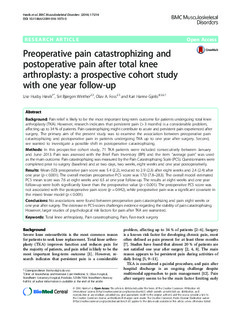| dc.contributor.author | Høvik, Lise Husby | |
| dc.contributor.author | Winther, Siri Bjørgen | |
| dc.contributor.author | Foss, Olav A. | |
| dc.contributor.author | Gjeilo, Kari Hanne | |
| dc.date.accessioned | 2016-09-02T11:46:17Z | |
| dc.date.accessioned | 2016-09-05T12:49:50Z | |
| dc.date.available | 2016-09-02T11:46:17Z | |
| dc.date.available | 2016-09-05T12:49:50Z | |
| dc.date.issued | 2016 | |
| dc.identifier.citation | BMC Musculoskeletal Disorders 2016, 17:214 | nb_NO |
| dc.identifier.issn | 1471-2474 | |
| dc.identifier.uri | http://hdl.handle.net/11250/2404333 | |
| dc.description.abstract | Background:
Pain relief is likely to be the most important long-term outcome for patients undergoing total knee arthroplasty (TKA). However, research indicates that persistent pain (> 3 months) is a considerable problem, affecting up to 34 % of patients. Pain catastrophizing might contribute to acute and persistent pain experienced after surgery. The primary aim of the present study was to examine the association between preoperative pain catastrophizing and postoperative pain in patients undergoing TKA up to one year after surgery. Second, we wanted to investigate a possible shift in postoperative catastrophizing.
Methods:
In this prospective cohort study, 71 TKA patients were included consecutively between January and June 2013. Pain was assessed with the Brief Pain Inventory (BPI) and the item “average pain” was used as the main outcome. Pain catastrophizing was measured by the Pain Catastrophizing Scale (PCS). Questionnaires were completed prior to surgery (baseline) and at two days, two weeks, eight weeks and one year postoperatively.
Results:
Mean (SD) preoperative pain score was 5.4 (2.2), reduced to 2.9 (2.3) after eight weeks and 2.4 (2.4) after one year (p < 0.001). The overall median preoperative PCS score was 17.0 (7.8–28.3). The overall model estimated PCS mean score was 7.6 at eight weeks and 6.5 at one year follow-up. The results at eight weeks and one year follow-up were both significantly lower than the preoperative value (p < 0.001). The preoperative PCS score was not associated with the postoperative pain score (p = 0.942), while preoperative pain was a significant covariate in the mixed linear model (p < 0.001).
Conclusions:
No associations were found between preoperative pain catastrophizing and pain eight weeks or one year after surgery. The decrease in PCS-scores challenges evidence regarding the stability of pain catastrophizing. However, larger studies of psychological risk factors for pain after TKA are warranted. | nb_NO |
| dc.language.iso | eng | nb_NO |
| dc.publisher | BioMed Central | nb_NO |
| dc.rights | Navngivelse 3.0 Norge | * |
| dc.rights.uri | http://creativecommons.org/licenses/by/3.0/no/ | * |
| dc.title | Preoperative pain catastrophizing and postoperative pain after total knee arthroplasty: A prospective cohort study with one year follow-up | nb_NO |
| dc.type | Journal article | nb_NO |
| dc.type | Peer reviewed | nb_NO |
| dc.date.updated | 2016-09-02T11:46:17Z | |
| dc.source.journal | BMC Musculoskeletal Disorders | nb_NO |
| dc.identifier.doi | 10.1186/s12891-016-1073-0 | |
| dc.identifier.cristin | 1372195 | |
| dc.description.localcode | © 2016 Høvik et al. This article is distributed under the terms of the Creative Commons Attribution 4.0 International License (http://creativecommons.org/licenses/by/4.0/), which permits unrestricted use, distribution, and reproduction in any medium, provided you give appropriate credit to the original author(s) and the source, provide a link to the Creative Commons license, and indicate if changes were made. The Creative Commons Public Domain Dedication waiver (http://creativecommons.org/publicdomain/zero/1.0/) applies to the data made available in this article, unless otherwise stated. | nb_NO |

